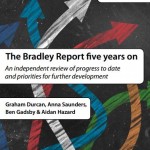
Last week we posted about the publication of a new manual for therapists engaged in providing cognitive behavioural therapy to people with learning disabilities . In that post, we drew attention to two randomised trials that had been done in the early 2000’s whose findings were m anger – encouraging. This latest study adds a [read the full story…]








